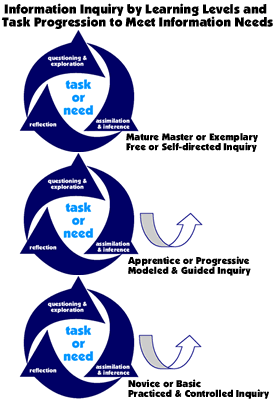Student Inquirers
Beginning student information scientists build relevant knowledge, skills, and attitudes as they are immersed in meaningful information inquiry activities. These student researchers are able to work independently using the scaffolding established by the instructional specialist to support their learning needs. These instructional specialists are often classroom teachers and school library media specialists working collaboratively to address the information and content area goals of the curriculum. As these novice inquirers gain skills and confidence, they are encouraged to reflect on their experiences and consider ways to address their weaknesses and build on their strengths.
 With each new investigation, students are asked to refine their inquiry practices and seek ways to enhance their learning experience. As students become increasingly proficient, the instructional specialist must continuously adjust the scaffolding to provide a balance of support and challenge. In addition, the student strive for self-reliance.
With each new investigation, students are asked to refine their inquiry practices and seek ways to enhance their learning experience. As students become increasingly proficient, the instructional specialist must continuously adjust the scaffolding to provide a balance of support and challenge. In addition, the student strive for self-reliance.
Learning Levels and Task Progression
The Young Learner – as novice, apprentice, master – has the opportunity to bring knowledge to self-learning and mature. To see not only where the learner is for the learning task, but where they can be.
What opportunities exist for the parent to teach (co-teach) the child; for the parent to be taught in advance of the child in formal and informal learning environments? How can parents and instructional specialists partner to promote a love of learning in their children?
The Adult Learner – as novice, apprentice, master –has a second opportunity to learn again, and again, and again – to change with change. They may not only respond to their environment, but master levels to actually construct it.
Are Self-Directed and Self-Sustained Learning methods of teaching or characteristics of a mature learner? Can learning to learn be taught and motivated? Does it need reward?
Click the image on the left to view a larger version. How do young people and adult learners mature as information scientists?
![]() Read Chapter 10: The Student as Information Scientist in THE BLUE BOOK by Callison and Preddy, p. 170-183.
Read Chapter 10: The Student as Information Scientist in THE BLUE BOOK by Callison and Preddy, p. 170-183.
